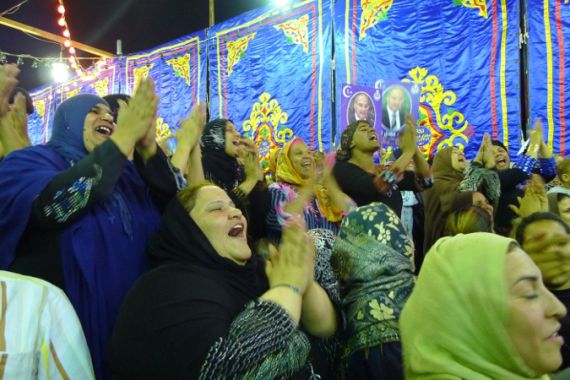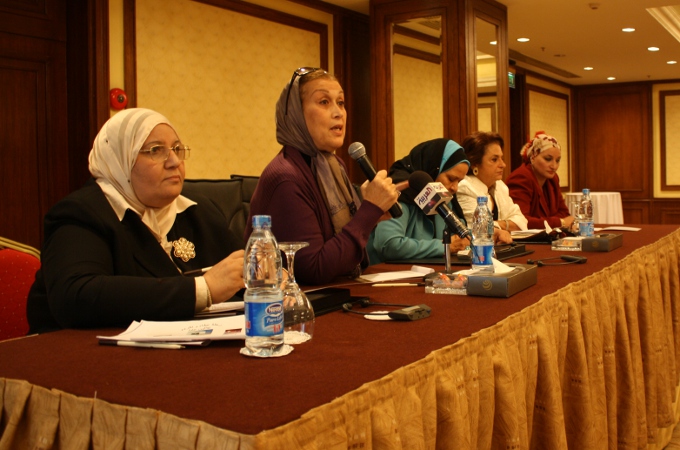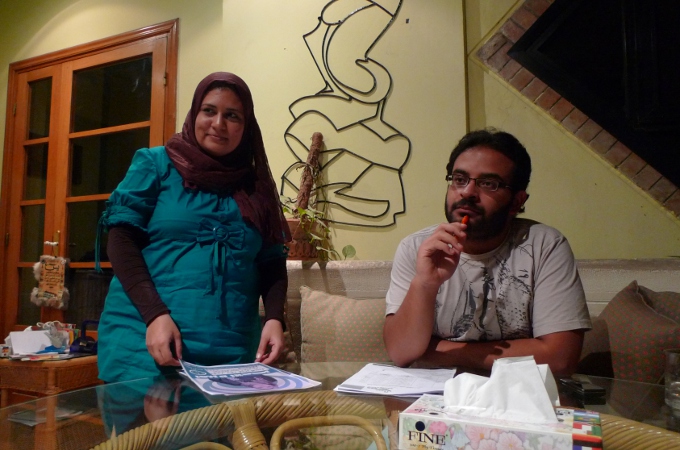Women make leap in Egypt parliament
A new law guarantees 64 seats to female candidates, meaning a 1,500 per cent rise in female parliamentarians.

 |
| Hoda el-Tahawy, a candidate backed by the ruling National Democratic Party for a female quota seat, speaks at a forum for female candidates. A wide spectrum of political parties have nominated women [Evan Hill] |
When the sun sets on Egypt’s election for its lower house of parliament on Sunday night, most observers anticipate that the vote will have been marred by fraud and possibly violence, and that the ruling National Democratic Party (NDP) will have again won the two-thirds majority it has held since 1979.
One outcome is certain, however: The number of women in the People’s Assembly will skyrocket.
Last year, the assembly passed a law mandating the creation of 64 new seats in the house that must go to women. With only four women elected in 2005, that means parliament’s female cadre will leap by a whopping 1,500 per cent, and 12 per cent of the new house will consist of women.
The quota is only meant to last for two rounds of elections, meaning it will expire in 2020, but women running for the seats hope it will jumpstart a new paradigm in Egyptian politics.
The decision to adjust the assembly’s gender balance by fiat has been met with vigour – 380 women are competing for the newly available seats, expressing hope that their participation will help force Egypt’s politics to reflect the powerful, public roles women have assumed over the past century.
But in some ways, the new wave of female candidacies reflects the country’s old themes: the perennial dominance of President Hosni Mubarak’s NDP and the traditional, conservative role society has long envisioned for women.
Society is changing
Last week, at a forum for female candidates held in a hotel conference room in the upscale Cairo neighbourhood of Dokki, NDP candidate Mediha Khattab found herself fielding a raft of questions about how to preserve marriages in Egypt, and keep young men and women from divorcing.
Khattab, although running for the first time, is a high-powered candidate with a background in health care. She is connected to Mubarak’s wife, Suzanne, has sat on the National Council for Women, and has served as the faculty dean of medicine at Cairo University.
Keep reading
list of 4 itemsUS university ties to weapons contractors under scrutiny amid war in Gaza
Scientists discover sperm whale ‘phonetic alphabet’
TikTok owner ByteDance files lawsuit against US law forcing app’s sale
She speaks like a practiced politician, never directly contradicting a potential supporter to their face.
When a hijab-wearing woman from the religious al-Azhar University asked Khattab, who wears a suit and no headscarf, if a law could be made to force the inclusion of a psychological counsellor in marriage contracts, Khattab chose not to answer directly.
Society is changing, she said, and divorce is on the rise; girls don’t get married to their cousins anymore.
“We have to overcome this,” she said.
And ultimately, she added almost as an afterthought, mandating psychological and medical tests for Egypt’s newlyweds would prove too expensive.
After Khattab successfully negotiated the question on government-mandated marriage counselling, she was confronted by a forceful voice from the same table, a seated bald man in a brown suit seemed more interested in stating his view of the facts than asking Khattab for hers.
The man, who later identified himself as Osama Shanawy, a high-ranking administrative official with the appellate court in Cairo, declared that most elected politicians run for office simply to gain access to the “VIP lounge” in the airport, “sit idly” in the parliament, and earn money, sometimes illegally, for themselves.
“I really hope women will be a breath of fresh air in the new parliament,” he said. “The question is not one of quota but one of performance.”
Quality not quantity
That’s a view shared by Mozn Hassan, the executive director of the Nazra Centre for Feminist Studies in Cairo. Hassan said that while the quota looks good from the outside, it conceals a host of more complicated problems.
“The quota system has definitely increased the number of women, we cannot deny that, but we’re more concerned with the quality of candidates rather than the quantity,” she said, adding that entering a public parliamentary race does not inherently mean a woman is a good politician.
“I’m worried about the kind of women that will join parliament. Many of them are women who are against women,” she said.
“They do not have to be feminists; we want to see women who will fight for women’s rights.”
Futhermore, using legislation to carve out space for women in parliament does not guarantee that society will accept them as powerbrokers, Hassan said.
“Women in Egypt exist in a protective system,” she said. “The quota system is only put forth to send an image that Egypt is becoming more democratic, but in doing so it overlooks other problems.”
Other female candidates, though forced to deal with the effects of their gender on a daily basis, do seem less interested in being feminists than in getting elected and addressing what they see as other, major problems in Egypt.
Quota law
The first part – getting elected – is almost hard enough. The quota law has created two new seats for women in 26 of Egypt’s 29 governorates. In three that were deemed too large for only two seats, including Cairo and Alexandria, there are four spaces.
In practice, this means that candidates like Khattab and and her competitors and peers are often running in districts that encompass four to six million people.
With the Egyptian electoral law allowing for only two weeks of campaigning, this means it’s impossible in practice for female candidates – at least without the infrastructure of a major party like the NDP – to promote themselves.
 |
| Amira el-Asar (L) and her campaign manager are competing in a district of four million people. [Evan Hill] |
Amira el-Asar, a candidate with the new Reform and Development Party, laughed when asked how many people in her district in Cairo knew who she was. Maybe half of the four million, she said.
Unlike rival female NDP candidates, who can appear in person and on campaign posters with male colleagues who are running throughout the country, Asar has maybe two allies in her party to join.
Asar, who is something of a rarity in her country being unmarried and childless at 32, said she approved of the quota law, even if it amounts to social discrimination.
“The good thing about it is that it finally recognises that the role of Egypt’s women is not only the eastern role of wife and kids,” she said.
Although Asar’s mother, especially, has supported her political efforts, her family fears that she is putting herself at risk of harassment, at the very least.
“For a woman to go out and shake hands and say, ‘This is me, vote for me,’ that’s difficult,” Asar said.
Still, she is making a strong effort. Lacking a car, she takes taxis out on the campaign trail, and she has recently started to ride Cairo’s crowded and hectic public transportation system to meet more constituents.
Asar’s social liberal Reform and Development Party, founded in 2009 by Anwar Esat Sadat, the nephew of assassinated president Anwar Sadat, faces an uphill battle against the NDP this year, like almost every opposition party.
Asar said she expects the NDP to commit fraud; for instance, by giving polling place workers envelopes packed with hundreds of ballots pre-marked for NDP candidates repeatedly throughout election day. But even though Asar said she expects NDP rival Zeinab Radwan to win, she will still try.
“The average Egyptian is pressured and feels like the ruling party is responsible for it,” she said.
Political survivor
The downtown Cairo office of the Nasserist Party is a fitting emblem for the state of the old political guard gone to pasture.
Brown water damage leaks through the ceiling, empty offices sit quietly as though unchanged since 1966, and the only things shining in the place are the large busts of former president and famous Arab nationalist Gamel Abdel Nasser himself.
Sowad Abdelhamid, a female quota candidate for the Nasserists and longtime figure in Egyptian women’s issues, acknowleded that the state of the party is somewhat dim: Their finances are bad, and since 2005, they lack a single representative in parliament.
But Abdelhamid is a survivor; politically active since the 1970s, she has worked in television and newspaper journalism and wrote a book on women’s rights – “Women and Positions” – in 1990.
While there is no “superwoman” who can cover the entirety of the districts they have been assigned, she said, the quota is still positive.
“There has to be a role for women in parliament, considering that women make up over half the population,” she said.
“This is an experiment … It is legitimate to have this temporary discrimination in favour of women”.
Like others, Abdelhamid believes the quality of the female politicians elected will shape Egyptian society’s opinion of women in parliament over the next 10 years.
“There need to be efforts on the educational, social and religious levels. Ten years is not enough to abolish the stereotype that politics is a man’s game,” she said.
While the symbol of Nasser is a powerful rallying point anywhere in the Arab world, Abdelhamid said, she still realises that she is outgunned by the NDP. The few posters her campaign has mounted around her district have been mostly torn down, and the NDP candidates always seem to receive more media time and more speaking time at conferences, she said.
“Anyone on the street can feel this difference from the amount of advertising, and the way state media focuses on the NDP’s candidates,” she said. “But we think it’s about the ‘how’ and not the ‘how much.'”
Voter apathy
For all of Abdelhamid’s faith, though, she and other quota candidates face a steep road, not only because they are women in a patriarchal society, but because the average Egyptian long ago lost interest and faith in politicians of any gender.
On a recent night in the Old Cairo neighbourhood of Egypt’s capital, down a dirty main street lit up by blinking, multi-coloured lights and echoing with amplified voices from the nearby NDP rally, a group of young women gathered at the entrance to a snack shop – all wearing hijab – expressed little interest in Madiha Khattab, who had just spoken up the block.
A 23-year-old lawyer who had just graduated from Cairo University and would only give her name as Hoda said, as many others have, that politicians come around for a few days during campaign season and then disappear forever.
Hoda did not know who Khattab was and said she was not going to vote, for a woman or anyone else.
“We are a republic, so the people should have the say, but all the power is in the hands of the leadership,” Hoda said.
The quota is a good law, she said; since Egyptians tend to prefer men in most things, even when looking for a law firm, putting women into politics is a necessary move. But in Egypt, if your vote doesn’t count, it doesn’t count for either sex.
With reporting by Heba el-Sherif and Lara el-Gibaly.